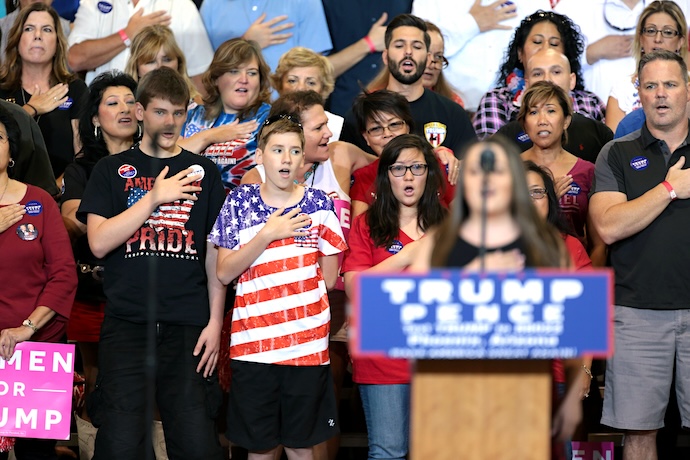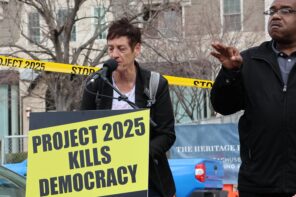It’s not every day a legitimate paradox turns up in national polling. But the Pew Research Center’s recent survey on the influence of religion on American public life seems to have uncovered one.
According to Pew, nearly three-quarters of White evangelicals think it’s important to have a presidential candidate with strong religious beliefs—indeed, a similar proportion want a candidate who shares their beliefs. Yet just 6% of those same voters think Donald Trump is very religious. Nearly half say he’s not religious at all.
One might put this seeming contradiction down to negative partisanship. Which is to say, White evangelicals think Trump is not particularly a man of faith, but Joe Biden is much worse. That matches survey results: 70% said Biden is “Not too” or “Not at all” religious.
It’s also possible White evangelicals simply see Trump as, to put it delicately, an imperfect representative of their cause. Which seems closer to the truth. More than two-thirds say Trump stands up for people with their beliefs—far more than any other religious demographic. Roughly the same proportion have favorable opinions of Trump.
Likewise, only a quarter of White evangelicals believe Biden stands up for people with their beliefs, and even fewer approve of him. Both numbers are much lower than any other segment.
Furthermore, almost the identical number of Republicans and White evangelicals believe Trump champions their beliefs and have a favorable opinion of him. Given that, it’s easy to see who makes up Trump’s political base.
So let’s assume that White evangelicals don’t think much of Trump’s personal piety. But they do trust him to advocate for them and their beliefs. Perhaps understanding more about those beliefs will explain the disconnect.
Robert Jones recently outlined how Trump himself discussed what he thought he was standing up for in a recent speech to the evangelical-dominated National Religious Broadcasters association. The short version is that, using disturbing and subtly violent rhetoric, Trump leaned heavily into fear, paranoia, and feelings of persecution.
Jones’ polling group PRRI has surveyed Americans on their support for White Christian nationalism, using a five-point definition of the term. Pew, on the other hand, doesn’t directly define what they call “Christian nationalism,” but they do ask about it. White evangelicals once again stand out in their responses.
For example, 86% think the Bible should have some or a great deal of influence on U.S. laws. The only other groups that come anywhere near that number are Hispanic Protestants (78%) and Black Protestants (74%).
White evangelicals are also the most likely to say that when scripture and the will of the people conflict, the Bible should win. Hispanic Protestants come in not far behind.
Interestingly, White evangelicals are not the most likely to say that the Bible currently has a great deal of influence on U.S. laws. Just under half agree, while nearly 90% of atheists think that’s the case.
Also worthy of note: only 31% of White evangelicals agreed that the federal government should stop enforcing separation of church and state. That’s higher than other demographics, but it’s still not a majority. A slightly higher number (35%) wanted to maintain the church-state boundary. Before secular government enthusiasts get too excited by this number I would point out that, for a fair number of evangelicals, the worry is that the state will interfere with the church, not the other way around.
Similarly, a little more than one in four White evangelicals said the federal government should declare Christianity the official religion of the United States. Far more (61%) said that Christianity should not be the official religion, but that government should promote Christian “moral values.” That was substantially higher than any other group. But promoting Christian values garnered majority support among every Christian demographic, except for Hispanic Catholics, who were equally likely to say the government should not establish Christianity or promote Christian values.
Of course, this question depends heavily on how one reads it. One person might simply think of Christian moral values as a broad commitment to care for all people, while another might have in mind a series of distinct theological positions. The former isn’t likely to clash with the church-state boundary while the latter almost certainly does.
Taken as a whole, the survey indicates that Christian nationalism isn’t a popular platform, even among White evangelicals. When respondents are presented with specific pieces of the project, they reject them, which matches other data, such as PRRI’s.
Yet Trump remains the overwhelming favorite of White evangelicals, which leads us back to the paradox. How can White evangelicals so strongly support a flawed leader who stands up for beliefs they may or may not actually hold?
The obvious answer is that Pew may not have uncovered the actual beliefs of Trump’s supporters. Or at least, not the beliefs that make a difference. Which is not to say the survey was a failure. The perspectives Pew asked about may very well be indicative of respondents’ beliefs. But they might not be the ones respondents operate from.
For those, I’m afraid we have to go back to Dr. Jones’ report on Trump’s rhetoric. To pull one example from the former president’s speech:
The greatest threat is not from the outside of our country. I really believe this. It’s from within. It’s the people from within our country that are more dangerous than the people outside. We can handle China. We can handle Russia. We can handle all of ’em if you have a smart leader. But the inside people are very dangerous. They’re very sick people, in my opinion. In many cases, they’re sick. I’m here today because I know that to achieve victory in this fight, just like in the battles of the past, we still need the hand of our Lord and the grace of Almighty God. We have to have that.
Trump continues to spew this bile day after day, broadcasting racist, anti-immigrant, transphobic and clearly authoritarian ideology. And still, two-thirds of White evangelicals approve of him. There might be a paradox between the expressed beliefs of Trump’s base and how they vote, but sometimes the best way to find out what you believe isn’t by what you say—it’s by what you do. If that’s any indication, White evangelicals believe some very, very ugly things.





